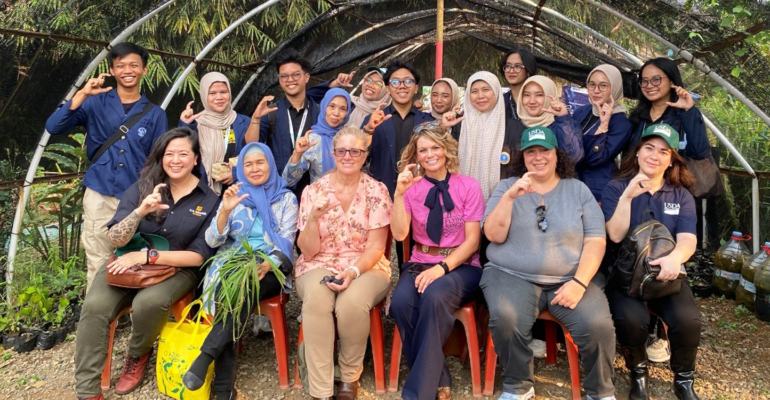Developing ‘Cenghar’ Innovation, IPB University’s PPK Ormawa Himasiera Team is Seen by the US Embassy

The Department of Communication Science and Community Development (SKPM) of IPB University together with the Student Organisation Capacity Strengthening Program (PPK Ormawa) team of the Student Association Interested in Communication Sciences and Community Development (Himasiera) has established cooperation with the Embassy of the United States.
This cooperation agenda was organised through a series of activities such as a seminar on women’s empowerment and a visit to Neglasari Village, Bogor, West Java.
The activities began with a women’s empowerment seminar themed ‘Adopting Technology, Increasing Productivity’ at the Salak Heritage Hotel in Bogor. The seminar was attended by relevant stakeholders, as well as several women farmer groups (KWT) in the villages around the campus. KWT Kemuning Asri, the target group of the Cerdas Ngawangun Harapan (Cenghar) programme, also attended the seminar.
The seminar presented two speakers from the United States, Jaclyn Wilson, a farmer from Nebraska, and Jennie Schmidt, a farmer from Maryland. The seminar also invited Dini Tri Lestari, a field agricultural extension officer (PPL) from Bogor District.
In addition to the seminar, the team from the US Embassy as well as Jaclyn and Jennie also visited Neglasari Village to see firsthand the results of women’s empowerment activities carried out by the PPK Ormawa Himasiera team. The visit began with a visit to the Neglasari Village Hall to explain the Cenghar programme and the Ubaran or ‘Arurang Ngobatan dina Pakarangan’ programme that is currently taking place in Neglasari Village.
‘With the arrival of guests from Uncle Sam’s Country and also IPB University students, it is hoped that it can bring enthusiasm to the community, especially for KWT mothers to continue to innovate in farming with technology, because at this time the Neglasari Village community is still fixated on the use of traditional tools,’ said Yayan, Neglasari Village Chief in his speech.
Jaclyn and Jennie, as well as the team from the US Embassy also had the opportunity to taste products made by KWT in Neglasari Village such as several variants of herbal medicine, ginger candy, and moringa tea.
The activity continued by visiting the UBARAN greenhouse located in RW 01. In this UBARAN greenhouse, the US Embassy as well as Jaclyn and Jennie, were enthusiastic to explore medicinal and family plants (toga). They actively asked and discussed about toga cultivation in Neglasari Village with the PPK Ormawa Himasiera team.
“This is a good start, what has been done, but for this to be better it may only need to make changes little by little and slowly,” said Jennie Schmidt, a farmer from Maryland.
They also gave a lot of input to the PPK Ormawa Himasiera team about toga cultivation. Jennie suggested doing a pH test on the soil in the greenhouse. Jaclyn also agreed with Jennie’s suggestion because she thinks getting to know what the plants need is very important in agriculture.
“Right now, there may be limited land to cultivate. But if the land is well-studied, we will never know what the yields will be. If it is well-studied and adapted to plants that can be grown well, the results can be 20 times what is produced now. The condition is that it has to be learnt,” said Jaclyn, a farmer from Nebraska.
Jaclyn and Jennie said they were very happy to see the toga cultivation in the Ubaran greenhouse in Neglasari Village. The discussion was closed with Jaclyn giving her contact information for further discussion in the development of greenhouses and toga in Neglasari Village. (*/Rz) (IAAS/RUM)



